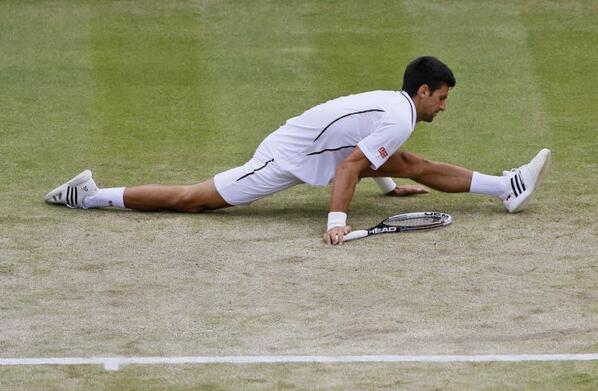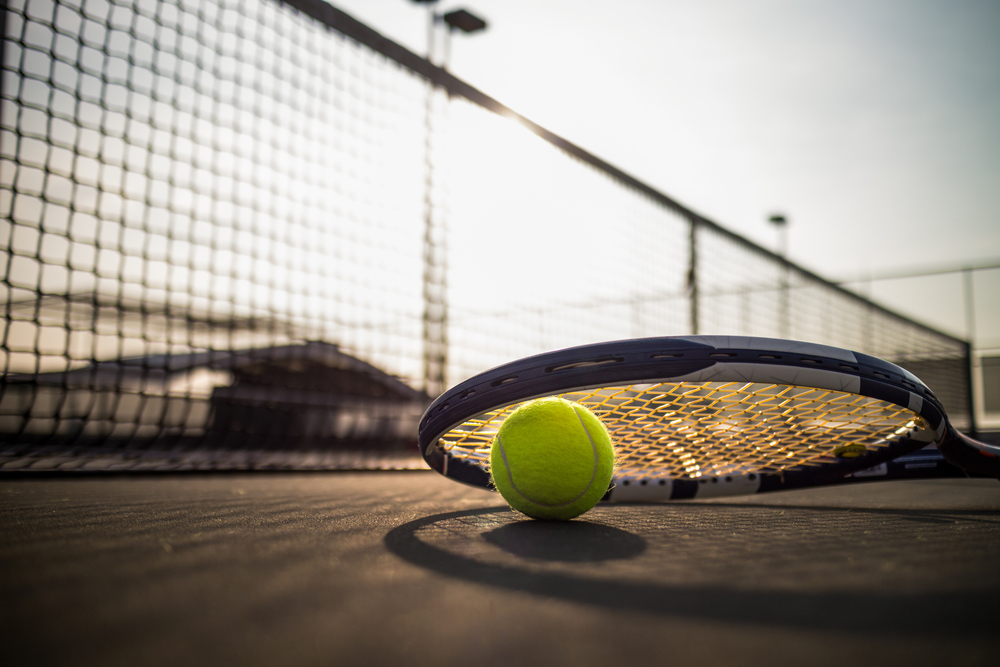I have a client who can pinpoint at a tournament which players will do well, and which won’t.
He will point to someone and tell me:
This guy is going to have a great run.
And that guy, he will struggle and break under pressure.
How can he know?
He observes what players do shortly before a match.
For example, if a top guy is sitting in a corner by himself or with his coach and looking extremely focused and calm, chances are that he will play well.
On the other hand, if he sees a tournament favorite sitting on the treadmill browsing at his phone and checking out random Instagram profiles, chances are he will also be distracted during the match.
This is when my client senses an upset.
What he realized is that in order to do well at a tournament, your preparation matters more than your ranking.

Roger Federer practice session in preparation for the match
Instinctively, we know this, which is also why most tennis players spend at least 30 minutes warming up on a practice court and then doing additional exercises off the tennis court to get themselves prepared.
If your muscles are not warm, your body won’t be ready to compete at the highest level.
But here is the key:
In the same way, we need to warm up our body before a match, we also need to warm up our mind.
This is because tennis is a sport in which you need to endure long periods of sustained pressure by yourself.
In fact, the only dialogue you will have during this time is the one with yourself- so it better be empowering.
What makes tennis especially tough is that it is very competitive and there is only one winner. This means that no matter how hard you work and how hard you try, you will never have a guarantee about the outcome of a match.
This can be very nerve-wracking, especially so when you have important people watching you, like parents or potential sponsors, who you do not want to disappoint!
The good news is that the one thing you can control is how you prepare for a match!
Since you are already spending time to prepare physically for your match, why would you leave your state of mind to chance?
Spending just another 15-30 minutes on your Mental Warm-Up can dramatically increase your chances of playing your best tennis and using your opportunities to win a match.
It can also be the difference between feeling confident and optimistic about your performance, or feeling frustrated and devastated about playing poorly in key moments of your match.
How to create a strong pre-match routine
Every good player has conscious or less conscious habits that they do before their matches, which usually include things like:
- Waking up at a specific time;
- Having breakfast;
- Preparing your tennis bag;
- Heading to the venue a few hours before their match;
- Warming up on a practice court;
- Talking tactics with their coach;
- Having something to eat again before their match;
- Taking a shower
Great players also have their pre-match routine, which usually starts at least 30 minutes before their matches.

Novak Djokovic warms up before the match
In his book, My Story Rafael Nadal describes his pre-match routine before his epic Wimbledon final win over Roger Federer, in 2008.
Forty-five minutes before facing Federer I began the last phase of my pre-game ritual.
I took a cold shower. Freezing cold water.
I do this before every match.
It’s the point before the point of no return.
Under the cold shower, I enter a new space in which I feel my power and resilience grow.
I’m a different man when I emerge. I’m activated. I’m in “the flow”, as sports psychologists describe a state of alert concentration in which the body moves by pure instinct, like a fish in a current.
Nothing else exists but the battle ahead.
I put on my earphones and listened to music. It sharpens that sense of flow, removes me further from my surroundings.
It is during this phase of your match preparation that you want to add do your Mental Warm-Up.
You want to prepare yourself mentally so you won’t feel distracted from all the emotions and thoughts that you might have related to your match.
Let me give you 5 simple steps that you can use immediately, around 30 minutes before a match, as part of your pre-match routine.
Ideally, you want to find a quiet place in the locker room where you can sit alone, undisturbed.
Step #1: Have a match plan
Before a match, it makes sense to spend time with your coach and develop a game plan which is based on what you know about your opponent and on lessons you have learned from past matches so you can improve your performance.
For example, maybe you are working on winning more return games, and one thing you and your coach realized is that you miss too many returns in an attempt to hit outright winners.
In addition, you know your opponent has a relatively weak serve.
So the strategy for return games might be to hit a deep return to the middle of a court as often as possible, hence reducing the risk of making errors while opening up the court for the rallies that follow.
In other words, you want to have a simple plan for the match, and revise it shortly before you go on court.
Step #2: Reduce pre-match anxiety
As a tennis player, it is normal to feel nervous before a match.
After all, you train hard and you want to reap the rewards of your hard work.
In addition, you don’t want to disappoint the people who have supported you throughout your career, and who may be sitting in the stands watching you.
It is normal to have thoughts like:
- My coach and my parents will be so disappointed if I lose this match.
- If I don’t win, I won’t qualify for the bigger events next month!
- I must do well this week as I am running out of money!
At the same time, this kind of concern will make you tense up in key moments of a match. This is why it is important to train yourself to silence your negative chatter.
One simple tool that can really help you feel more relaxed instantaneously is your breathing, and that is exactly what we want to focus on during this phase of our Mental Warm-Up.
So here is what I suggest you do:
Hopefully, you are already sitting down in a quiet place, where nobody will disturb you, and if appropriate, close your eyes.
Next, take 10 deep breaths.
To really make this process relaxing, you may want to count to 4 while you breathe in, then hold your breath for 4 counts, then breathe out and count to four, and then hold your breath again for four breaths.
So each repetition requires 16 counts.
Once you do this ten times, you should feel more relaxed.
Step 3: Visualize Your Match
Once you feel more relaxed and calm, you can now focus to prepare yourself for your upcoming match.
The most effective way to do this is by visualizing yourself playing a great match and seeing yourself think the thoughts and feel the emotions that you would like to experience throughout the match.
The reason visualizations work so well is because we are literally rehearsing for our match.
In fact, just consider what Novak Djokovic says:
Visualization is a big part of everybody's life, not just athletes. I strongly believe in visualization. I believe that there is a law of attraction: You get the things that you produce in your thoughts. Life just works that way.
To achieve this, you want to spend a few minutes going through your upcoming match, as if you were playing it in real-time.
This means you visualize key moments like:
- Walking onto the match court feeling pumped up and excited.
- Feeling a bit nervous at the beginning of the first set but calming yourself down.
- Executing your game plan successful and winning points by using the strategy you have discussed, together with your coach.
- Coming back from breakpoints by staying super composed and focused.
- Staying tough when you are winning and preventing doubtful thoughts from taking over your mind.
- Playing your best tennis during big points.
- Noticing how you feel nervous about closing the match, but then calming yourself down and winning the match.
- Feeling extremely happy about how you played and celebrating with your team right after the match.
To get the most from your pre-match visualization, I suggest you actually allow yourself to experience the emotions you would be feeling in a match in those specific situations, and then consciously replace them with the thoughts and emotions that would serve you best.
For example, if you are down a breakpoint, you might feel nervous and anxious.
I want you to imagine situations like being down a breakpoint, feeling nervous, but then consciously visualizing how you calm yourself down.
You might picture yourself taking a few deep breaths, closing your eyes for a second and focusing on how you want to play the next point.
Once you do that, visualize yourself playing a good point and winning the game.
The goal with your visualization is to create clear mental pictures and impressions of the match situations you will face, and then seeing yourself handle those situations in a manner that serves you.
This is how you will prepare yourself for a mentally strong match.
Step 4: Eliminate Distractions
Once you have completed the first three steps, you may need to wait until your match gets called on. During this time, you want to maintain your focus and avoid any distractions.
This means that you either rest by yourself in the locker room or spend time with members of your team who do not expose you to any kind of negative distractions that might put you off for the match.
During this time, I recommend you avoid using your phone and keep it locked up in the locker room- for two simple reasons.
First, when you browse your phone, you are allowing random inputs to stimulate your mind.
For example, you might receive a disturbing email, or see a post that makes you feel upset or even sad.
This is not helpful- at this stage, you want to control how you feel and what you think so that you feel ready and prepared for your match.
Second, by constantly being distracted, you train your mind to shift its attention from one thing to the next, which will make it almost impossible to be fully focused once your match begins.
Instead, you want to spend the remaining time before your match doing your final preparations and staying present, relaxed and focused.
This might mean putting on your match clothes, putting grips onto your racket and hydrating yourself.
Then while you wait, you can do things like continuing to visualize key moments of your match, listening to music or just finding a quiet spot and reading a good book that will allow you to stay relaxed.
Step 5: Elevate your energy and confidence shortly before the match
Ok, so you are a few minutes before you actually stepping onto the court.
Now you want to get both your body and your mind ready for your match and feel both energized and confident.
Here are a few simple things you can try out to get yourself into your best performance state:
- Stretch your body.
- Take a cold shower.
- Move your body for a minute or two, so you feel explosive, energized and ready.
- Have your pre-match music play-list: If you feel you need to calm down before your match, listen to relaxing music. On the other hand, if you feel you need to be more energized, listen to something more lively.
- Have affirmations that help you feel confident, like:
“I love competing! I am so ready for this! I am going to give my very best!”
Bonus tip:
I recommend that you create a trigger that helps you amplify your performance state the second you step onto the match court.
This could mean looking at the court and taking a moment to visualize feeling confident, and then heading to your seat like a true warrior while repeating a few affirmations.
Or it could be something you do after the coin toss, like springing to the baseline a la Nadal.
To sum up, your ideal Mental Warm-Up routine before a match should take around 20-30 minutes and look something like this:
- Discuss your Game Plan with your coach for around 5 minutes.
- Spend 5-10 minutes to get yourself into a relaxed and calm frame of mind, for example by using a simple breathing technique and listening to peaceful music.
- Visualize your match and key situations with clear pictures and elevated emotions for around 10 minutes...
- Eliminate distractions before the match and maintain a relaxed and focused mindset up until you step onto the court.
- Elevate your energy and confidence by moving your body, repeating affirmations and listening to uplifting music shortly before stepping onto the match court.
I realize you won’t always know when your match will start, so I suggest you schedule your Mental Warm-Up around 30 minutes before the expected playtime.
In case for some reason you have less time, you can reduce the length of each step.
The key is to practice your Mental Warm-Up so that it becomes second nature and you show up mentally prepared for every match!
If you have any questions related to creating your Mental Warm-Up, just comment down below. If you want more Mental Drills to upgrade the way you play your matches, you will love the Ultimate Guide to becoming a Mentally Tougher Tennis Player.
In this Guide, you will learn:
- 13 mental toughness drills that will give you the confidence to fight hard and give your best regardless of the score.
- How to constantly improve your game, love the thrill of competition and become a world class player by practicing less not more!
- What you need to do in those pressure filled moments that make feel so tense you can barely hold your racket!
You can download the guide below.

Get your free PDF copy of my 25,430 words long epic Ultimate Guide To Becoming A Mentally Tough Tennis Player and learn:
13 mental toughness drills that will give you the confidence to fight hard and give your best regardless of the score.
How to constantly improve your game, love the thrill of competition and become a world-class player by practicing less not more!
What you need to do in those pressure-filled moments that make feel so tense you can barely hold your racket!
